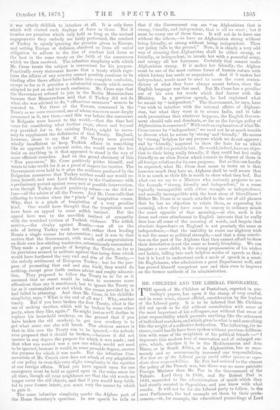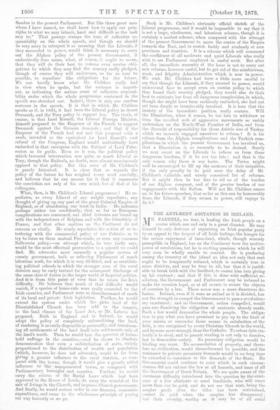MR. CHILDERS AND THE LIBERAL PROGRAMME.
THE speech of Mr. Childers at Pontefract, reported in yes- terday's papers, has upon it the stamp of very careful, and in some sense, almost official, consideration by the leaders of the Liberal party. It is to be inferred that Mr. Childers did not speak as he did without consultation with some of the most important of his colleagues, nor without that sense of joint responsibility which prevents anything like the utterance of individual crotchets, and which gives to what is said, something like the weight of a collective declaration. The following, for in- stance, could hardly have been spoken without previous delibera- tion with some of the weightiest of his political friends :—" I deprecate this modern love of i annexation and of enlarged em- pire, which, whether it be n the Mediterranean and Asia Minor, or in South Africa, or in Afghanistan, has so enor- mously and so unnecessarily increased our responsibilities. Not that we of the Liberal party could either ignore or repu- diate those responadities. Mr. Fox had resisted to the utmost the policy of the French war, but there was no more patriotic Foreign Minister than Mr. Fox in the Government of the
Talen i
Talents. Lord Grey n 1830, and Sir Robert Peel in 1841, succeeded to the administration of much which they had stoutly resisted in Opposition, and you know with what results. It will not be for the Liberal party to follow, in the next Parliament, the bad example set them by their prede- cessors,—in, for example, the educational proceedings. of Lord Bandon in the present Parliament. But like those great men whom I have named, we shall know how to apply our prin- ciples to what we may inherit., hard and difficult as the task may be." That passage stamps the tone of collective re- sponsibility on the whole speech, and though we should be very sorry to interpret it as meaning that the Liberals, if they succeeded to power, would think it necessary to carry out the Afghan policy of the present Government, it undoubtedly does mean, what, of course, it ought to mean, that they will do their best to redeem even unwise obli- gations to which they may find the country really pledged, though of course they will endeavour, as far as may be possible, to repudiate like obligations for the future. We can hardly know what lir. Childers really had in view when he spoke, but the sentence is import- ant, as indicating the serious sense of collective responsi- bility under which the whole programme contained in the speech was sketched out. Indeed, there is only one careless sentence in the speech. It is that in which Mr. Childers speaks as if, in 1864, it had been the Liberal policy to desert Denmark, and the Tory policy to support her. The truth, of course, is that Lord Russell, the Liberal Foreign Minister, himself proposed to the Emperor of the French to support Denmark against the German demands ; and that if the Emperor of the French had not met this proposal with a snub, intended as the equivalent for Lord Russell's curt refusal of the Congress, England would undoubtedly have embarked in that enterprise with the Cabinet of Lord Palm- erston as its guide. Even as it was, the political policy which favoured intervention was quite as much Liberal as Tory, though the Radicals, no doubt, were almost unanimously opposed to that policy. But this error of Mr. Childers's
is purely historical. It is clear that as regards the policy of the future he has weighed every word carefully, and believes that he can answer for it that it represents the conviction not only of his own mind, but of that of his colleagues.
What, then, is Mr. Childers's Liberal programme 1 He re- pudiates, as every Liberal of any weight repudiates, any thought of giving up any part of the great Colonial Empire of England, or of abandoning our trust in India. He indicates perhaps rather too confidently, that so far as European complications are concerned, our chief interests are bound up with the independence of Belgium and with the friendship of Prance, and that other matters on the Continent do not concern us vitally. Ho wisely repudiates the notion of so in- terfering with the commercial policy of our Colonies as to try to force on them mutual Free-trade, or even any common Zollverein policy,—an attempt which, he very justly says, would be the most effectual provocative to a quarrel we could find. He advocates most earnestly a popular system of county government, both as relieving Parliament of much laborious work, for which it is very ill-fitted, and as establish- ing political schools in which the stronger men of the rural districts may be early trained for the subsequent discharge of the same class of duties in the larger world of Imperial politics. And it is from this point of view that he treats the Irish difficulty. He believes that much of that difficulty would vanish, if a species of home-rule were really conceded to the Irish counties, and Parliament were so disembarrassed of much of its local and private Irish legislation. Further, he would extend the system under which the glebe land of the Disestablished Church has been sold to the tenants, to the land clauses of the Land Act, as Mr. Lefevre has proposed. Both in England and in Ireland, he would adopt the policy of completely enfranchising the land, of rendering it as edsily disposable as personalty, and transform- ing all settlements of the land itself into settlements only of the land's worth. Then he would face the question of house- hold suffrage in the counties,—and he shows to absolute demonstration that even a redistribution of seats, strictly proportioned to the distribution of wealth and population (which, however, he does not advocate), would be far from giving a greater influence to the rural districts, as com- pared with the towns, though it would give a greatly added influence to the unrepresented towns, as compared with Parliamentary boroughs and counties. Further, he would carry the reform of the Burial Laws which had been approved in the House of Lords, do away the scandal of the sale of livings in the Church, and improve Church government. And finally, he would restore order to our finances, economise ex.penditure, and recur to the wholesome principle of paying our way honestly as we go. Such is Mr. Childers's obviously official sketch of the Liberal programme, and it would be impossible to say that it is not a large, wholesome, and laborious scheme, though it is certainly a modest scheme, when compared with the attempt of the present Government to move the centre of the Empire towards the East, and to snatch feebly and aimlessly at new provinces and frontiers. It is a scheme which will command the confidence of all moderate and quiet Liberals who really wish to see Parliament employed in useful work. But after all, the immediate necessity of the hour is not to carry out new reforms, however useful, but to get rid of the mischievous, weak, and fldgetty Administration which is now in power. We wish Mr. Childers had been a little more careful to say that though the Liberals, if they succeed to power, would understand how to accept even an unwise policy to which they found their country pledged, they would also do their best to extricate her from all dangerous complexities, in which, though she might have been recklessly embarked, she bad not yet been deeply or irretrievably involved. It is here that the anxiety of the immediate position really centres. Will the Dissolution, when it comes, be too late to withdraw us from the ravelled web of aggressive movements so rashly undertaken on the North-West Frontier of India, and from the discredit of responsibility for those Asiatic sins of Turkey which we insanely engaged ourselves to reform I It is for release from the Afghan complications and the Turkish com- plications in which the present Government has involved us, that a Dissolution is so earnestly to be desired. Surely we may count on the Liberals to relieve us from these dangerous burdens, if it be not too late ; and that is the only reason why there is any haste. The Tories might well be encouraged to fill up the measure of their iniquities, if the only penalty to be paid were the delay of Mr Childers's valuable, and wisely conceived list of reforms. But it might then be too late to rid us of the burden of our Afghan conquest, and of the greater burden of our engagements with the Sultan. Will not Mr. Childers assure us, in his future speeches, that so far as this can be honourably done, the Liberals, if they return to power, will engage to do it



































 Previous page
Previous page